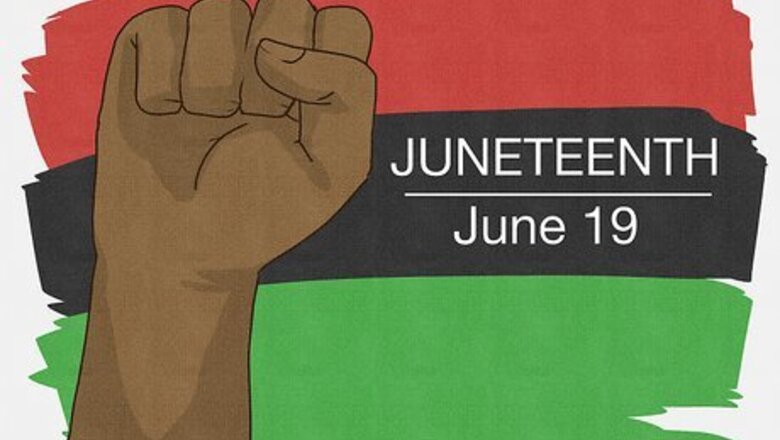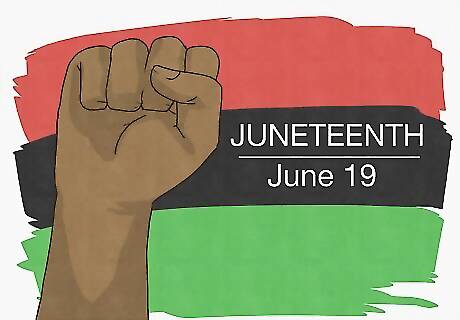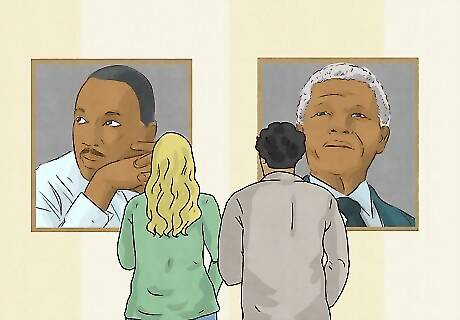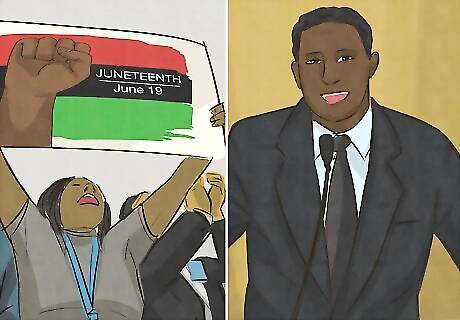
views
Explore the history of Juneteenth.

To celebrate Juneteenth, you must recognize its origin and importance. The end of slavery in the US was not cut-and-dry; it took months after the Civil War ended and 2 years after the Emancipation Proclamation passed for news to reach Texas. Use books, essays, and online publications to educate yourself on both the history and meaning behind Juneteenth and Black history as a whole. Authors such as Annette Gordon-Reed and Ralph Ellison have written influential novels about Juneteenth. For most non-BIPOC Americans, July 4 is Independence Day—but it's essential to understand that the Declaration of Independence didn't actually grant freedom to everybody in America. Remember that American history as taught in schools tends to be highly whitewashed, ignoring crucial aspects of Black culture. Just because you've studied history doesn't mean your knowledge is complete yet!
Visit a Black museum or cultural institution.

These spaces can teach you more about Black history and culture. Many museums also have interactive presentations, lectures, and performances designed to educate audiences in a fun and interesting way! You can find museums with exhibits on Black history by running a quick Google search or using a directory of African American museums to find one in your area. To check out a directory, visit https://www.blackpast.org/african-american-museums-united-states-and-canada/.
Support Black-owned businesses.

This is a great way to show solidarity as an ally. Celebrate Juneteenth by eating out and giving money to an independent Black-owned restaurant. Treat yourself while shopping at an independent Black-owned shop. Before you go shopping, research brands that come from Black creators and designers so that you know who you're supporting the next time you go to the store. To find Black-owned businesses, you can check out a directory like https://www.blackbusinessgreenbook.com or https://blackwomanowned.co/business-listings-2-0.
Consume Black media and art.

Support Black creators and further educate yourself in the process. Think about the majority of media you consume. Who makes it? Do you normally take in a healthy balance of media from different cultures and ethnicities? Black voices are often silenced in pop culture, but you can work to reverse that by listening to music, watching movies and shows, and reading books by Black creators on Juneteenth. Many music and video streaming platforms will often compile playlists to celebrate Juneteenth and Black artists. A quick search can yield many different options for you to explore.
Listen to Black voices.

Honor Juneteenth but accept that it doesn't belong to you as an ally. Take a step back and commit to listening more than you speak as you celebrate. When it comes to activism and being an ally, the most important things you can do are observe, pay attention, make space for Black voices, and ask your BIPOC (Black, Indigenous, and people of color) friends what they need from you as you work to create change in society. Be aware of the spaces you're taking up. Juneteenth is a holiday made by and for Black Americans. All Americans need to recognize it, but that doesn't mean you should start attaching new meanings or adding your own celebratory elements. For example, instead of making your own social media post about how important Juneteenth is, share a Black writer's perspective on the holiday so that your friends or follower base can read about the holiday too.
Make a donation.

Support organizations that serve Black communities. Donate your money and other resources to organizations like Black Lives Matter, the Loveland Foundation, and the American Civil Liberties Union if you have the means. If you're strapped for cash at the moment, that's okay! You can always volunteer your time at a local organization instead. Find Black Lives Matter at https://blacklivesmatter.com. Check out the Loveland Foundation at https://thelovelandfoundation.org. Donate to the ACLU at https://www.aclu.org. Donate to more targeted organizations that support the Black LGBTQ+ community, too, like The Okra Project (https://www.theokraproject.com) and the Marsha P. Johnson Institute (https://marshap.org).
Attend a local celebration.

Many cities now host Juneteenth events that are open to the public. Juneteenth is a day to celebrate freedom and everything that Black Americans have overcome, and citywide celebrations can be another source of knowledge to educate yourself. Do some research on your town or city's website on Juneteenth events, and speak to your Black friends about attending a celebration. Some Juneteenth events are virtual. Do a little online research to find livestreams of speeches, performances, and other Juneteenth festivities.
Reflect on your actions and beliefs.

Unlearn any prejudices you have developed over the years. As you familiarize yourself with Juneteenth and learn more about America's long history of racism, it's important to examine your own behavior and mindset. Acknowledge your role (both personally and as part of a larger ethnic group) in continuing racial prejudice in America. Take steps to identify and rectify those harmful practices in your daily life. It's important to recognize that you were born into some biases about race as someone who isn't Black. It can be tough to unlearn them, but it's your job to keep trying as an ally, no matter how long it takes. For example, you may have ignored racist comments in the past or not cared about racism because it didn't affect you. When you acknowledge these flaws, it helps you become a stronger ally in the future.
Join the fight for racial equality in America.

Attend protests and encourage lawmakers to enact change. Take action and speak out against discrimination and oppression wherever you see it. Being an ally is more than just having sympathy for a cause. It's about using your privilege as someone who is non-BIPOC to confront and break down institutional racism and challenge other non-BIPOC friends and family to rethink their stances on race. If you have relatives and friends who may be ignorant of Juneteenth and its importance, share your research materials with them and educate them in turn.
Recognize Juneteenth in your workplace.

Whether you're a boss or employee, you can take steps to honor the day. If you have employees, you can give them the day off on Juneteenth to recognize its status as a federal holiday. If you work at a place that doesn't already recognize Juneteenth, petition management to make it a company holiday. Companies can also take steps to make this holiday more meaningful than just a convenient day off. Sponsoring employee visits to museums or cultural sites, for example, could help educate the public about Juneteenth.
Celebrate throughout the year.

There's no wrong time to support Black businesses and creators. Juneteenth isn't the only time to be mindful about how you act, where you shop, and the media you consume. Make a point to educate yourself where you need to and continue to be an active ally throughout the year.




















Comments
0 comment